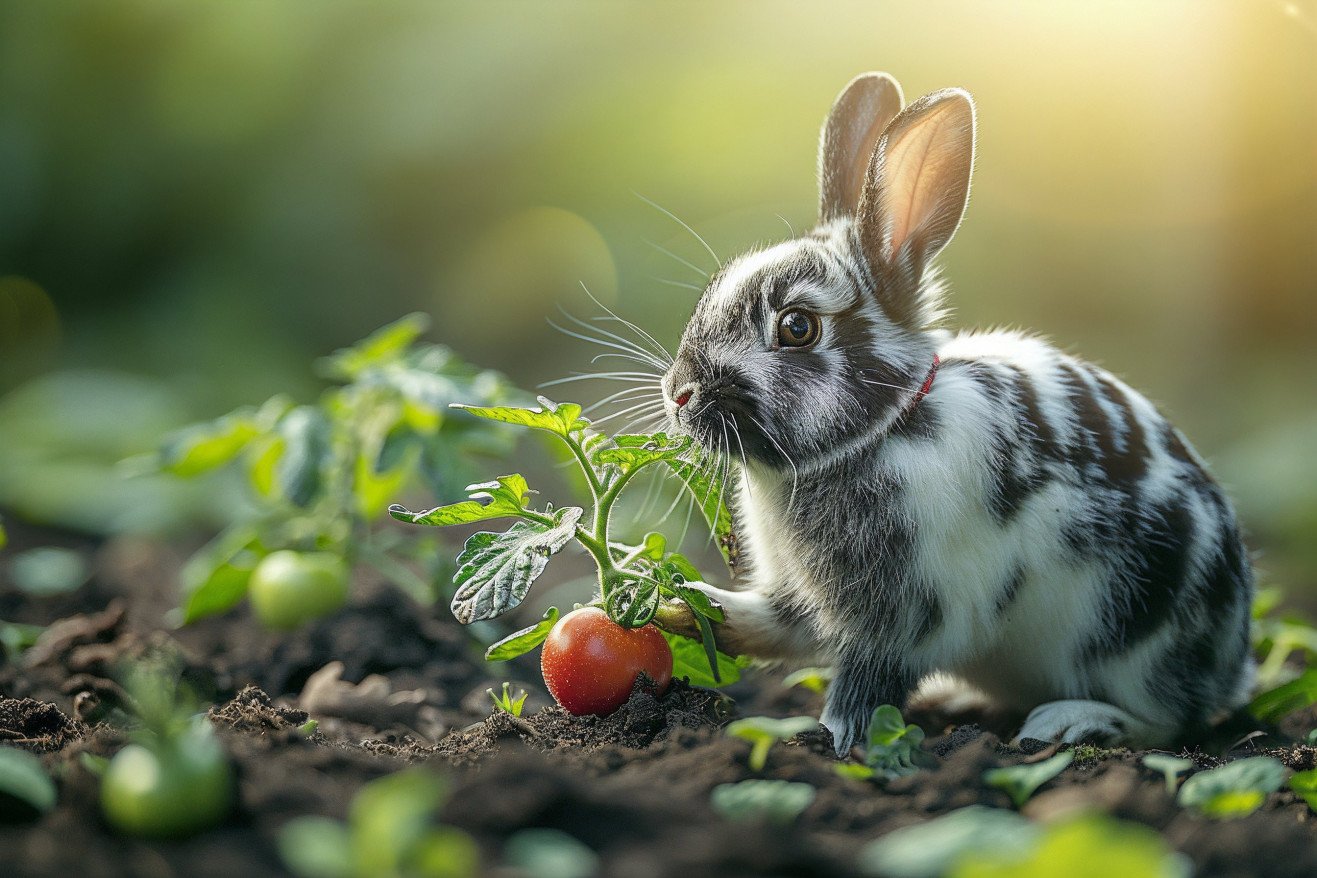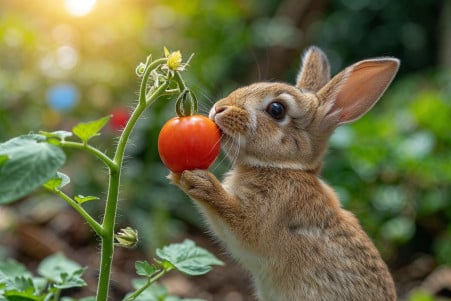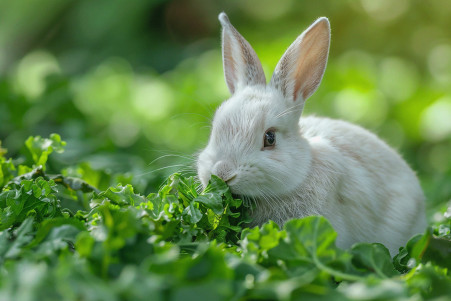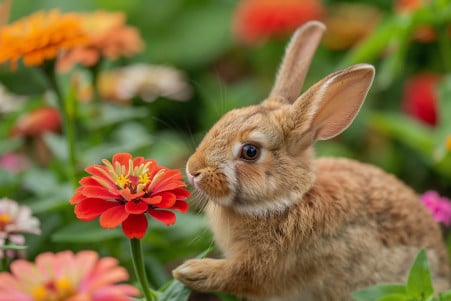Do Rabbits Eat Tomato Plants? Garden Safety and Rabbit Diets Explained
11 February 2024 • Updated 10 February 2024

Gardeners, take note: rabbits may not be able to resist your precious tomato plants. While rabbits are likely to eat the tender green leaves and fruit of tomato plants, they are unlikely to eat the leaves, stems, and seeds, which contain substances that are toxic to them. As a result, gardens with tomato plants are likely to need some form of rabbit control.
This article will review the results of agricultural experiments, wildlife studies, and insights from horticulture to provide a comprehensive look at what rabbits eat. It will also consider the fine line between a rabbit’s dietary needs, its natural eating habits, and the dangers posed by garden plants, including tomato plants. This will help you find a way to protect your garden while also taking the needs of these animals into account.
Do rabbits eat tomato plants?
Rabbit Nutrition: More Than Just What’s in the Garden
Fiber is the most important part of a rabbit’s diet, and it should come from hay and specially formulated pellets. According to the Merck Veterinary Manual, hay is important because it provides the necessary scratch factor that aids in gastrointestinal motility, and pellets are important because they provide a complete and balanced source of vitamins and minerals.
When it comes to treats, they should be limited. Fruits and vegetables can be fed to rabbits, but they should be thought of as a special treat instead of a dietary staple.
Tomatoes can be fed to rabbits as a treat, but it’s important to make sure that any toxic parts of the plant, including the leaves and seeds, are removed to avoid any health issues.
The Dodo notes that only the flesh of the tomato should be fed to rabbits, and even then, it should be fed in small, acorn-sized pieces to rabbits that are at least 12 weeks old.
While rabbits can eat a variety of fruits and vegetables, they tend to eat the ones that are higher in nutrients and lower in fiber. This can lead to obesity if it’s not monitored, so it’s important for both pet owners and gardeners to understand this about rabbits. This selective feeding behavior can impact the garden, as rabbits will eat high-energy-density plants like tomatoes, but only in a controlled and safe way.
The Rabbit and the Garden: How to Protect Your Plants
Rabbits are known for their love of fresh, green plants, especially those that are young and tender. According to Horticulture and Home Pest News, rabbits can cause a lot of damage to a wide range of flowers and vegetables, including the juicy leaves of tomato plants. If rabbits are able to access the plant, they will eat the lower leaves and stems, which can weaken or even kill the plant.
That said, rabbits tend to avoid plants with strong smells and those with hairy leaves. A study published by Iowa State University Extension and Outreach even listed plants that rabbits are less likely to eat, including herbs and some perennials, which can help gardeners plan a rabbit-resistant garden.
To protect your tomato plants and other plants that rabbits are likely to eat, The Spruce recommends using non-toxic methods like scent repellents, such as garlic and chili pepper, and physical barriers like chicken wire. By learning about rabbits’ eating habits and the plants they’re less likely to eat, gardeners can make informed decisions about what to plant and how to protect it, which can help rabbits and gardens coexist.
Meeting the Nutritional Needs of Rabbits While Allowing Tomato Plant Consumption
Rabbits have evolved to have a highly specialized and complex digestive system that requires a high-fiber diet to maintain gut health and avoid obesity. As the Merck Veterinary Manual explains, rabbits need a high-fiber diet that includes enough “scratch factor” to keep the gastrointestinal system moving.
Even non-productive pet rabbits don’t need high levels of protein, which is an important part of their diet. When considering the relationship between rabbits and tomato plants, it’s important to realize that the nutritional value of tomatoes doesn’t necessarily align with the rabbit’s need for fiber.
While tomatoes can provide some nutritional variety and enrichment, their low fiber content and high water and sugar content mean that they don’t meet rabbits’ basic nutritional needs.
Rabbits can be poisoned by the leaves, stems, and seeds of tomato plants because they contain alkaloids that are toxic to rabbits. As a result, while rabbits may be attracted to the colors and textures of tomato plants, the nutritional content of tomatoes and the potential health risks of the toxic parts of the plant mean that this attraction should be carefully managed.
Gardeners may notice rabbits eating their tomato plants, but that doesn’t mean that tomatoes are the best food for rabbits. Instead, this is an example of rabbits’ curiosity about what they eat and the importance of making sure that their diet meets their nutritional needs. From a gardener’s perspective, it also means that steps should be taken to make sure that rabbits don’t eat the tomato plants.
How Wild and Domestic Rabbits Forage
Wild rabbits’ natural diet can provide some clues as to whether they would eat tomato plants. Wild rabbits are natural foragers and, as a result, have adapted to eat a wide variety of plants based on what is available in their environment.
Their diet primarily consists of grasses and leafy weeds, which are high in fiber and essential for their digestive health. The Rabbit Welfare Association suggests that domestic rabbits’ diets should be based on this natural foraging behavior, with a diet that is primarily hay and leafy greens and only a small amount of treats.
While there is no direct evidence that wild rabbits seek out tomato plants, their generalist feeding behavior means that they may eat them if they are growing in their environment. However, the seasonal availability of plants means that their diet is constantly changing based on what is available to them.
On the other hand, domestic rabbits depend on their owners to provide them with a safe and healthy diet.
An article on rabbit nutrition stresses that rabbits are hindgut fermenters and need a diet that is high in fiber, with the majority of their food coming from good quality hay.
In addition, the RSPCA lists plants that are poisonous to rabbits, including ivy and holly, which shows that it’s important to be careful about what you feed your rabbit and to make sure that your garden is secure so that your rabbit can’t eat anything that might be harmful. Gardeners can use this information to create secure spaces that keep rabbits away from potentially poisonous plants, including parts of the tomato plant.
Navigating the Toxic Terrain: Protecting Rabbits from Poisonous Garden Plants
While garden plants can be beautiful and even nutritious, they can also contain toxic chemicals that are dangerous to rabbits. For example, tomato plants contain alkaloids like tomatine in their leaves, stems, and green unripe fruit, all of which are toxic to rabbits.
A study in ScienceDirect found that many animals, including rabbits, tend to avoid common milkweed because of its toxicity, and this avoidance can be generalized to other toxic plants. This means that once rabbits learn that a plant is toxic, they will avoid it and other plants like it.
That said, while rabbits’ natural avoidance of toxic plants can be helpful, it’s not a surefire way to keep them safe.
Gardeners need to take steps to ensure that rabbits are not exposed to toxic plants. This can include using physical barriers or planting non-toxic plants that rabbits find unappealing to keep them away from areas where toxic plants are growing.
Natural rabbit repellents made from plant secondary metabolites, such as terpenes and phenolics, as outlined in New Phytologist and PMC, could also be used to discourage rabbits from eating toxic plants by taking advantage of their natural avoidance of certain plant chemicals. These steps will help ensure that rabbits stay healthy and our gardens stay intact.
A Happy Medium: Rabbit Diets and Tomato Plant Protection
In the end, the relationship between rabbits and tomato plants is a careful balance that depends on understanding the dietary needs and foraging habits of these animals.
While rabbits may be drawn to the lush greenery of a tomato plant, it’s important to remember that only certain parts of the plant are safe for them to eat. The fruit of the plant is safe to eat in moderation, while the leaves, stems, and unripe fruit are toxic and can be harmful.
The importance of a rabbit’s high-fiber diet, which includes hay and leafy greens, cannot be overstated, and gardeners need to keep this in mind as they work to protect their gardens from these animals. However, with careful planning, gardeners can protect their tomato plants from rabbits using humane methods like barriers and natural repellents that won’t hurt the animals.
In the end, this investigation underscores the larger responsibility that gardeners have to protect wildlife. By creating an environment that balances the nutritional needs of rabbits with the safety of our gardens, we can create a mutually beneficial relationship with the natural world. In short, gardeners can create a garden that thrives while coexisting with the animals that live in it through thoughtful care.


